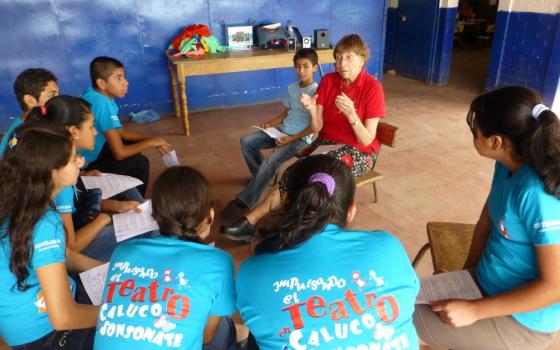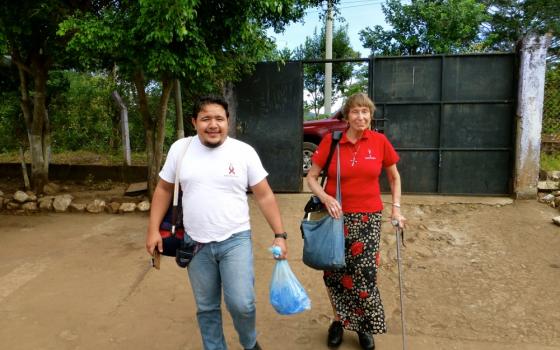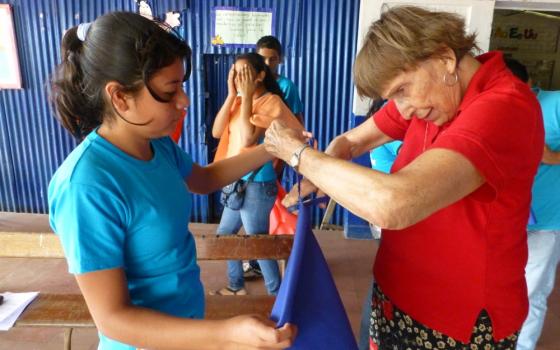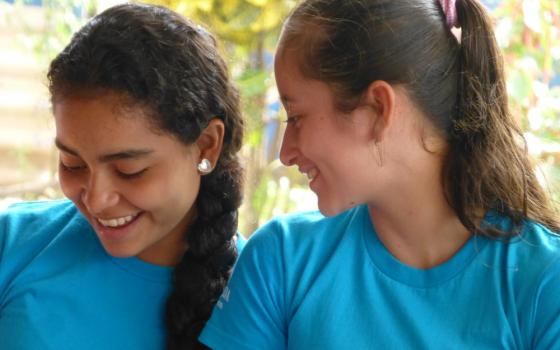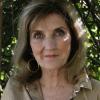Dawn glared red over San Salvador as Sr. Mary Virginia Annel’s team packed an aging maroon station wagon with supplies for a day’s journey to a remote village at the end of a mountain road. There they would unroll one facet of the work they do every day, struggle against the proliferation of HIV/AIDS in this tiny Central American country, still rebounding from a 12-year civil war that took 75,000 lives, most at the hands of a U.S.-supported army.
Annel, 74, entered the Maryknoll order at age 18 and became a medical doctor, serving in neighboring Guatemala. She arrived in El Salvador the year after the peace treaty was signed in 1992. By then she had “methodically, coolly looked at where the health challenges for the future were globally,” as a public health professional. “I’m a thinker, not a feeler,” she insisted during an interview the day before the team’s trip into the countryside.
Born in Chicago, willowy tall with short dark blonde hair, Annel wears a long, dark skirt with red flowers of light fabric appropriate for the steamy weather. Her red polo shirt is embroidered with the Spanish name of the education and accompaniment group she founded, CONTRASIDA, and its logo: a white candle with an ever-burning flame embraced by a red HIV/AIDS awareness ribbon. In the early 1990s the AIDS epidemic was raging.
“As Maryknoll sisters, we’re used to doing an analysis, then going,” she said. “I did homework, attended courses, surveyed Maryknoll sisters on AIDS in Africa, Southeast Asia and other parts of Latin America. Then I recommended we go to countries next door to AIDS epicenters to work on prevention, and keep the disease from spreading.”
Annel spoke in a modest downtown office hung with a wall-sized poster depicting four martyred women, Maryknoll Srs. Ita Ford and Maura Clarke, with whom she had been on retreat shortly before their deaths, Ursuline Sr. Dorothy Kazel and lay missioner Jean Donovan.
“Our identity is to be with the people,” she said. “We were all doing things seen as subversive. It was a privilege to be a martyr because so many people were being killed for the Gospel. It was not a death wish. We are one with the people.”
On Dec. 2, 1980, in the midst of the civil war, Ford, Clarke, Kazel and Donovan were raped and murdered by members of the El Salvadoran military.
In the early 1980s the first Central American AIDS case appeared across the border from El Salvador in Honduras, an infected dentist who returned to his home country after living in San Francisco. Honduras became the epicenter of the epidemic in Central America. Thousands of Salvadorans had fled to Honduran refugee camps to escape the massacres perpetrated by a U.S.-supported army; Annel reckoned that returning Salvadoran refugees at least would have heard of AIDS, one starting point for education.
Beginning as an Archdiocesan team, now a non-profit foundation (proper name: Fundación Salvadoreña para la lucha contra el sida “Maria Lorena”), Annel’s group grew to number 20 social workers, communicators, pastoral accompaniers of the afflicted and 250 volunteers. Soon CONTRASIDA was reaching 40,000 people a year with classes, literature and workshops for teachers and others who might “multiply” correct information.
In El Salvador as elsewhere, AIDS was stigmatized, even considered punishment for wanton sexual behavior. Families unaware of how the disease was transmitted isolated affected members, feeding them with disposable plates; a Catholic school run by nuns kicked out children of stricken parents. Dioceses and government agencies including prisons came to CONTRASIDA with more requests every month for education.
Annel found openness in the church, where the late Archbishop Arturo Rivera y Damas formally presented the team to clergy. Fr. Fabián Amaya, then vicar of pastoral care, delivered words that might describe CONTRASIDA itself.
“We have our ideals from Jesus’ message: the dignity and equality of every person, what true love really is, abstinence before marriage and marital fidelity,” said Amaya. “But we can’t afford to be absolutist in our ideas. We must accompany the people where we find them.”
CONTRASIDA first concentrated on urban areas “where people don’t have community underpinnings,” opening a clinic that currently serves 200 patients a week. For some, clinic day has become a family celebration where patients and relatives including children spend hours, receiving hot lunch, educational talks, support visits by volunteers. When the school year begins, AIDS orphans and children of parents with HIV are given books and uniforms.
“Today the epidemic has become focalized,” said Annel – and has become a chronic disease. It affects heterosexual people, but its highest prevalence is among transgender people; men who have sex with men; and commercial sex workers, including young girls trafficked in ports and border areas that serve as stepping stones to the United States. At least 25,000 people live with HIV/AIDS here, about 0.4 percent of the population of some 6 million, although the United Nations agency UNAIDS has estimated some 40-50 percent of cases are not reported.
When CONTRASIDA began, only one other HIV/AIDS-focused group existed here, made up of gay men who had lived in the United States; today there are more than 50. From having the second-highest rate of the disease among the six Central American countries, after Honduras, El Salvador has dropped to fifth place. The government provides free medication.
Nevertheless, women are increasingly infected, partly a result of a culture of machismo that assumes having multiple sex partners is a proof of masculinity. And the stigma of HIV/AIDS persists, while “people still consider it fatal,” said Annel, even though it is controlled with medication taken correctly. A high birth rate makes the population lopsidedly young – 30 percent are under age 15 – and sexual relations begin early. That is why Annel is increasingly expanding outreach to adolescents, like those she is going to visit in the village some two hours away from the capital. The doors close on the packed car, and dawn turns into sunrise as the team hits the road.
Social worker Angel Torres, 28, takes the wheel and soon brings the station wagon onto open highway fringed with fields of sugar cane, miles of soft pink feathered plants whose blooms announce the harvest is near. Torres began to work at CONTRASIDA after attending one of its regular “Masculinities and Prevention of HIV” workshops, two intensive weekends at a retreat center with other men who engage in participatory learning in the model of Paulo Freire, games and reflection, even sessions on cooking and aromatherapy “to awaken the senses and feminine energy.” The aim is to become conscious of the implications and risks of the traditional macho way of being a man, with discussions of violence against women, sexual diversity, and active, sensitive fatherhood.
“In the United States condoms are the be all and end all” in HIV prevention, said Annel. “Here we tell people they are more than their thinking, they are their hearts, too, and try to get them to take themselves to the future.”
At the same time, CONTRASIDA covers sex education and customary preventions – abstinence, faithfulness to one partner, condom use. Upcoming masculinity workshops, and femininity workshops promoting self-esteem and awareness of sexually transmitted diseases, are scheduled for Supreme Court staff, seminarians and police in line for promotion to officers.
In the main town of the department of Sonsonate, Torres and Annel drop off two CONTRASIDA “communicators” at a radio station where they will broadcast an interview about a Mass for the upcoming World AIDS Day, a global event to raise awareness, show solidarity with people living with HIV and commemorate those who have died. Next stop: the ancient town of Caluco, where the paved road stops, the heart of a region high in HIV/AIDS cases. With a local team member, Oscar Alcantara, 29, Torres and Annel measure church aisles where youngsters will sing and dance during the Mass. Then it’s another 40 minutes up a road of slippery clay, past sustenance plots of corn and beans, houses made of corrugated tin, or sticks and mud bricks.
In the schoolyard of the village called Gramales (population 1000), a crowd of young teenagers waits anxiously. They wear bright T-shirts bearing the name of one of several CONTRASIDA theater groups organized around the country to bring HIV/AIDS awareness to adolescents, encouraging them to understand and accompany the afflicted in their parishes.
“We learn a lot, about HIV, and about how we don’t have to accept violence against us,” said Miriam Pleiter, 14.
“And we learn how to act,” said Pleiter’s friend, Evelin Vasquez, also 14. “I love it.”
Schooling here only reaches ninth grade, and it’s unlikely more than two or three of these bright-eyed young people will proceed to the nearest high school more than an hour – and hard-to-afford bus fare – away. For today, they throw themselves into the practice at hand.
“We pray that these youth will not be affected,” begins Annel. “We pray they will not only extend a hand to those with HIV but become multipliers of education and information.”
Torres and Alcantara drill the dancers, and Sister Maria, as the young people call her, cuts up swatches of bright fabric for the Mass event, working hand in hand and laughing with the students. The bedsides of the ill seem far away, but the talk and activity in tiny Gramales is part of the struggle against HIV/AIDS, too, an aspect of its understanding and prevention. Over the hours wind picks up and blows below the village across the plain that spreads to the Pacific, slate blue in the distance. On another day, Annel has said she used to become ill with bronchitis every time she lost a patient, feeling she had failed as a doctor. Finally someone in a similar situation told her, “I give thanks for the gift that person has been in my life.”
“That thinking was different from what I got in medical school, seeing death as a failure,” she said. “I see we are really in God’s hands. We are all dying. What I’ve done is appreciate more now the loving heart of people.”
A circle forms, and Annel tells the youngsters that the testimony of a person living with HIV will be read during the Mass. They will help to light candles held by participants, each marked with the name of someone who has died.
Six people a day are infected with HIV/AIDS in El Salvador. The task of confronting the disease, especially among the poor, remains huge, but Annel and her teams appear unflinching. This day is typical, and it will be long. Even after collecting the “communicators” in Sonsonate, jerry-rigging a mechanical fix to the sputtering car en route and returning to the capital in the late afternoon, there will be meetings at the office, visits to make. For the moment, however, Annel belongs to the young people in the mountain village. She leads more practice on the song they will intone at the AIDS Mass. The music is lilting, and the refrain carries a spirit of hope:
“Something new is being born, in my people it is beating like a heart,” they sing. “Growing with us, something new is being born, growing among the poor.”
[Mary Jo McConahay is a prize-winning author, documentary filmmaker and freelance journalist who has reported widely on social justice issues.]
